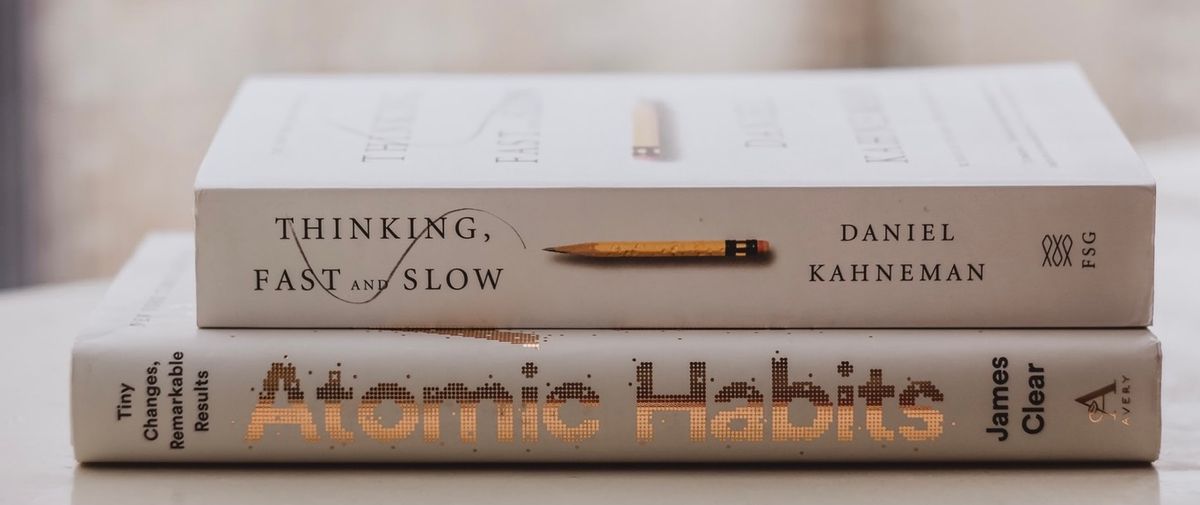Atomic Habits by James Clear Notes
Success is the product of daily habits — not once-in-a-lifetime transformations.

What are habits?
Habits are consistent actions that we take. They can be good or bad; big or small. For example, going to the gym 4 days a week can get us our dream body. But drinking a glass of wine a night can ruin our health even though it seems inconsequential.
Tip 1 of 15
We are what we say we are.
- “I’m terrible with directions.”
- “I’m not a morning person.”
- “I’m bad at remembering people’s names.”
- “I’m always late.”
- “I’m not good with technology.”
- “I’m horrible at math.”
What we define ourselves as can be a self-fullfilling prophecy.
We can change the way we think about ourselves by changing our habits: "Every action you take is a vote for the type of person you wish to become."
Tip 2 of 15
Time management: Write down everything you do in a day. Then write a +,-, or = to show if it is positive, negative, or neutral. Try to remove negative or neutral habits.
- Do your current habits lead you to be the kind of person you want to be?
Tip 3 of 15
Implementation intention: Have a plan of when and where you will act. This makes you much more likely to do it.
- It is essential to choose an environment that is conducive to your goals: "In the short term, you can choose to overpower temptation. In the long run, we become a product of the environment we live in."
- The people around you determine how you will turn out. Join a group where your desired behavior is the normal behavior.
Tip 4 of 15
It is important to have the right perspective. Whenever you have to do something difficult, replace the “have to” with “get to.” For example, I "get to" wake up early for work.
- A man in a wheelchair was asked if it was hard being confined. He said, "I'm not confined by my wheelchair, I’m liberated by it. If it wasn’t for my wheelchair I would be bed-bound and unable to leave my house."
Tip 5 of 15
There is no difference between being anxious and being excited. When you are about to do something that might make you nervous, instead say, "I am excited and I’m getting an adrenaline rush to help me concentrate."
Tip 6 of 15
The difference between a good day and a bad day is the choices that you make.
- Choices earlier in the day are more important.
- One bad choice limits how good a day can be.
- Making all good choices creates a peak good day.
Tip 7 of 15
The two minute rule: When you start a new habit, start small. It should take less than 2 minutes. It’s easy to start too big.
- “Read before bed each night becomes read one page.”
- “Do 30 min of yoga becomes take out my yoga mat.”
- Writing one sentence is how your get started on essays.
Tip 8 of 15
Stop before is starts to feel like a hassle. This makes you more likely to want to keep doing it in the future.
Tip 9 of 15
One-time actions that lock-in good habits:
- buy a water filter to clean your drinking water
- use smaller plates to reduce caloric intake
- buy a good mattress
- get blackout curtains
- remove all TV’s
- unsubscribe from emails
- turn off notifications and mute group chats
- put your phone on silent
- use email filters
- delete games and social media apps from your phone
- get a dog
- move to a friendly, social neighborhood
- get vaccinated
- buy good shoes to avoid back pain
- buy a supportive chair or standing desk
- enroll in an automatic savings plan
- set up automatic bill pay
- end cable service
- ask service providers to lower your bills
Tip 10 of 15
The more immediate pleasure you get from an action, the more strongly you should question whether it aligns with you long term goals.
Tip 11 of 15
The paper clip strategy: Making progress is satisfying. When you need to get something done that you don’t necessarily want to do, move a paperclip from one jar to another so that you can physically see the improvements you are making.
Tip 12 of 15
Habit tracking is helpful. Use a habit tracking app, journal, or calendar.
- Habit tracking should be limited to the most essential habits. Like hydration, diet, sleep, gym, and reading.
Tip 13 of 15
It is natural that you will have to miss a habit at some time due to an emergency. Tell yourself that you will not miss 2 days in a row. This keeps you from breaking the habit. Missing once is an accident, missing twice is the start of a new habit.
Tip 14 of 15
You don’t realize how important it is to do your habits on your bad days. Lost days hurt you more than successful days help you.
- Finance analogy: If you start with $100, then a 50% gain will take you to $150. But you only need a 33% loss to take you back to $100. In other words, avoiding a 33% loss is just as valuable as getting a 50% gain.
Tip 15 of 15
Accountability partner: Make a contract that you sign that plans out your goal. Then, if you break the contract (quit your habits), you have to pay the other person $X.
- Having a partner where you both want to do something (a gym partner, for example) makes you want to continue your habits because if you don’t there could be social reprocussions. They might see you as lazy or untrustworthy.
Advanced Tactics
Tactic 1 of 6
How to know you’ve found the right career:
- What feels like fun to me but work to others? When you can handle the pain of the task easier than most people? When are you enjoying yourself when others are complaining?
- What makes me lose track of time? When you can get into a flow state and lose track of time it means you generally like the task.
- Where do I get greater returns than the average person? Whatever you're naturally good at and finding success with will naturally draw you in.
- What comes naturally to me? When have I felt alive? When have I felt the real me? No internal judgement or people-pleasing.
Tactic 2 of 6
Everyone has at least a few areas where they could be in the top 25% with some effort.
The standards go down when you can do two things and fuse them together.
Tactic 3 of 6
A great player creates a new game that favors their strengths and weaknesses.
Find a very small niche and work at that relentlessly. Even if you’re not the most naturally gifted, you can often win by being the best in a very narrow category.
- People get so caught up in the fact that they have limits that they rarely exert the effort to get close to them.
Tactic 4 of 6
Correctly set the difficulty level of your goals.
The goldilocks rule: people are at peak motivation when a task is just difficult enough. If it’s too easy, people will become bored. If it’s too hard, people will give up.
- To achieve a proper flow state, the task must be about 4% beyond your current ability.
Tactic 5 of 6
Real successful people have the same lack of motivation and can find boredom in their passion too. The difference, and the reason they are successful, is that they show up despite the feelings or boredom.
- On the journey of self improvement you have to fall in love with boredom.
Tactic 6 of 6
When we become elite at things, we can do them on autopilot which means we stay at the same skill level or dip slightly. To avoid this, we need deliberate practice.
- Habits + deliberate practice = mastery
- Always continue to refine and improve technique and habits so you don’t plateau or decline.
- You must reflect and objectively determine if you are continuing to progress.
- Improvement is not just about learning habits, it’s also about fine tuning them.



Comments ()